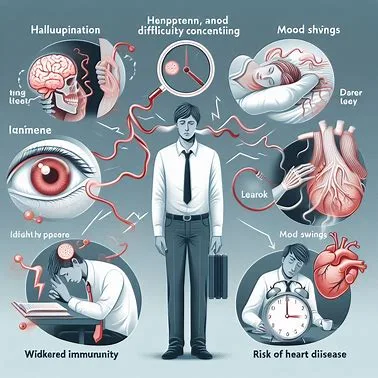Better Sleep for Better Health!!
Sleep is the best tonic for our body and mind. Everyone needs enough good night’s sleep, depending on his age, work and health. A good night, ‘s sleep repairs the wear and tear of body tissues, energises our nerve cells, reduces stress and lowers the risk of diabetes and heart problems. When a person does not have sound sleep for one or two days, it is called short-term sleep deprivation, if this period stretches from some days to some weeks, it may create serious physical as well as mental problems.
The impact of poor sleep can be seen in all aspects of life. Short-term sleep deprivation is very normal and it may improve automatically. It can be due to:
Fatigue/Stress
Lack of physical exercise
Overeating at a late hour in the night
An uncomfortable bed
Unpleasant weather
Any health issue
Long screen time

Our body can adjust to these unfavourable conditions up to some extent but if sleep deprivation extends to a longer period it may create a drastic effect on our mind. Our hormonal glands fail to produce neurochemicals that rejuvenate our neurons. In this condition, our brain is exhausted and finds it difficult to make decisions, concentrate or learn new things.
Our central nervous system can not process information properly. which may affect a person’s decision-making power. It may increase the chances of accidents.
Long-time sleep deprivation may cause hallucinations seeing things and listening to sounds that are not there. It may also cause Fatigue, mood swings, Difficulty concentrating, Loss of short-term and long-term memory, weak immunity, high BP, risk of heart disease, weight gain, and loss of balance and coordination.
We should observe the reasons for less sleep. We can put them in three categories. The first one is the wrong lifestyle- a night shift job, drinking alcohol or caffeine, poor napping habits, and jet lag.

Some mental health issues may cause sleeplessness as anxiety, depression and schizophrenia. Sometimes physical health conditions of the person may be a reason for sleep deprivation for example continuous pain in some parts of the body, snoring, uncontrollable sensation in limbs, and illness.
Other reasons include the blue lights of various apparatus at night can also be a reason. Our disturbed circadian rhythms may also be the root cause of sleepless nights. Circadian rhythm -our body’s internal clock is a natural cycle of twenty-four hours of our body systems, mostly affected by sunlight and darkness. Social environment and temperature also affect sleep.
To Prevent Sleep Deprivation –
Regularize your body clock—sleep at fixed times every day, and avoid using the TV or the computer till late at night.
Daytime nap should not be more than 30 minutes.
Calm your mind before bedtime, wash your face, listen to soothing music and wear light cotton clothes.
Exercise or walk daily. Keep your bedroom dark, peaceful and with minimum noise, Use comfortable bedding and pillows, avoid synthetic bedding, and avoid tea, and coffee, before bedtime.
Get 30 minutes of exposure to sunlight daily. Eat dinner at least two hours before going to bed. Break the connection between your bed and frustration. If you are unable to sleep even after 20 minutes of spending in bed, come out, do some work, and go to bed when you feel sleepy.
Note down your sleep timings every day and mention your daily physical work, food, and type of friends you met that day. It will clarify the connection between your night sleep and your daily routine. If you are not able to have a sound sleep, after making much effort, and your problem is worsening and affecting your health, it is time to have a bit of personalized advice from a doctor.


